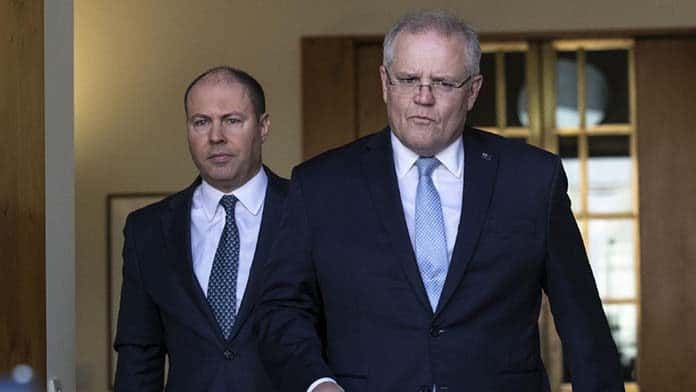Scott Morrison’s ministerial power grab was not an aberration but an example of the secrecy and lack of democracy that exists under capitalism, argues Maeve Larkins
When former Prime Minister Scott Morrison’s power grab over several ministries was revealed last year, there was outrage about his contempt for democratic institutions. But his move indicated how limited the democracy we have is.
Morrison secretly appointed himself Minister for Health, Finance, Home Affairs, the Treasury, as well as Industry, Science, Energy and Resources. These appointments were only revealed by a journalist after Morrison lost the election.
The powers he assumed as health minister in the pandemic under the Biosecurity Act were similar to introducing martial law. They meant an ability to close international borders and deploy the military with effective impunity.
Morrison used these powers on only one occasion: to block an offshore gas exploration project that some Liberal MPs feared would tip their electorates towards the Teals. But the full scope of the powers that Morrison consolidated, the ease with which he secured them and his success in keeping them secret caused outrage.
After Labor’s win, Anthony Albanese criticised Morrison for threatening “public confidence in government” and said his secret appointments “fundamentally undermined the principles of responsible government”.
The response from the mainstream press was much the same. The Financial Times wrote, “It is a reminder of the need for vigilance in shoring up the processes and institutions of democracy.”
Labor’s parliamentary inquiry into the appointments recommended several measures to try to prevent this kind of power grab in future, including requirements to make ministerial appointments public.
However, the saga has exposed how the system we have allows a tiny group of people to run the government in secret and to avoid accountability from parliament or the media for months if not years.
Parliamentary democracy
Every three years we are given the opportunity to vote in a new government. What happens between elections, however, is up to the politicians who are elected. Quite often, politicians promise to improve our lives in the lead up to an election but then walk back or junk their promises afterwards.
For the length of their term, they can govern with impunity, so long as they regain public face by the time of the next election.
For instance, when Tony Abbott broke his promises and forced through a horror budget of cuts in 2014 we had to wait two years before his party dumped him out of fear they’d lose the coming election.
Albanese promised ahead of last year’s federal election that all refugees on Temporary Protection Visas would be granted permanent visas—something that could happen within weeks. But he has spent the last eight months stalling and still hasn’t said when he will honour his promise.
Governments work to keep their decisions secret all the time. In 2018, ASIO raided the offices of the ABC after it obtained secret “classified” documents left in a filing cabinet which detailed government decisions over more than a decade.
They included evidence of how Morrison, as immigration minister in 2013, had demanded ASIO delay security checks so he could prevent a group of asylum-seekers being granted permanent visas. They also showed John Howard sought to remove the right to remain silent in custody in 2007.
Cover-ups, false promises and power grabs are all so common in our parliamentary democracy that the word “politician” has become a by-word for dishonesty and corruption. The Australian Election Study completed after last year’s election found only 30 per cent believe people in government can be trusted, although satisfaction with democracy jumped from its previous 59 per cent with the change of government.
Why so undemocratic?
Although we can choose who controls government, the parliament we vote for is fundamentally restricted because it is subordinate to the wider capitalist system.
Capitalism distorts democracy in all sorts of ways. Politicians are paid enormous salaries, with a starting rate for backbenchers of $211,250. This means MPs come to see themselves as part of the elite, distant from the mass of ordinary people. Being a politician is also a career that encourages shifty, self-serving and back-stabbing manoeuvres to ensure re-election.
The parties and politicians need big money to run their campaigns. Open corruption, where companies exchange money for contracts or favourable decisions, is discouraged. But the reason the major parties get corporate donations is that big companies know they will generally support business interests, mining developments and greater capitalist profits.
Parliamentary structures are also undemocratic. While we have federal elections every three years, we get the chance to elect only half the senate each time. This acts as a brake on major shifts in Australia’s political landscape.
Parliament has no power over the wider capitalist economy, the vast bulk of which is controlled by the small group of CEOs and senior managers who run the major companies.
Funding for healthcare, the unemployed or preventing climate catastrophe are all seen as less important than making sure that the biggest companies in Australia maintain their investments and operations in the economy.
Even at the height of government stimulus during the pandemic, federal government spending still accounted for less than 30 per cent of the economy. Including state governments and councils it is now around 38 per cent. This means that the vast majority of business and investment decisions are in the hands of private capitalists.
This gives business the power to force any parliamentary government to serve its interests. The left-wing deputy leader in the Whitlam government, Jim Cairns, explained that many of his economic plans came to grief because “we have to respond to the needs and demands of the large companies”.
Any government that angers businesses too much risks companies deciding to close up shop, threatening thousands of jobs and the disappearance of goods from the market.
Numerous left-wing governments have been broken or disciplined by the power of capitalists and the money markets. Recently they even went after a British Tory government.
When Liz Truss announced plans for massive spending and tax cuts for the rich last year, the fact that it was all funded by debt so appalled business that the government’s creditors on the stock market tanked the price of the British pound and bonds, threatening an economic meltdown.
Truss had to resign and the policies were abandoned. An attempt by a left-wing government to pursue radical change would get even more ruthless treatment.
Even beyond this, the heads of government departments and other parts of the state, such as High Court judges, military generals, police chiefs and senior public servants, are completely unelected.
Any government seeking to introduce radical change against the interests of the billionaire corporations would face opposition from within these state institutions that could force them from power.
In Chile in 1973, Greece in 1967 and Argentina in 1976, this led to military coups that toppled governments and saw thousands of their supporters killed to re-establish capitalist order.
Workers’ democracy
In a genuinely democratic society the whole economy would be under popular control. The history of attempts at radical change have shown that this requires getting rid of the existing capitalist state and its standing army and police through socialist revolution.
Workers have seized control of their workplaces and begun running them under democratic control many times over the past 150 years. Some examples are in France in 1968, Chile in 1973, Spain in 1936 and in the Iranian revolution of 1979.
The most developed example was the workers’ councils known as soviets during the Russian revolution in 1917, but such bodies have emerged time and time again at times of high levels of workers’ struggle.
In Russia, workplaces were run through a mass meeting with open debate and discussion. Each workplace would make democratic decisions about what needed to be produced, in co-ordination with delegates elected to larger meetings at a regional and national level.
These delegates were instantly recallable if they misrepresented their workmates and never paid more than the average workers’ wage.
During the Russian revolution, soviets were also set up to represent women and other oppressed groups.
In place of the separate police and military institutions today which exist above and outside of society and protect the ruling class, all state functions were put under democratic control, organised directly by workplace delegates through the soviets.
A workers’ state would be run according to the democratic decisions made through the active debate and participation of the majority of society. Such a democracy would be totally hostile to secret appointment to any ministries, or government run outside democratic scrutiny. The Russian soviets produced the most democratic society achieved in history to date.
The Russian revolution saw workers seize power and overthrow capitalism for a few short years. But the lack of development in Russia, its isolation from the rest of the world and the brutal impact of civil war led to a counter-revolution.
Workers lost control to an overgrown bureaucracy. Under the leadership of Stalin, this bureaucracy introduced a system of state capitalism that killed all that remained of genuine workers’ democracy.
But the possibility of real democracy and an end to the misery and inequality of capitalism has been shown again and again at high points of workers’ rebellions and social movements.
Every strike and grassroots movement in the here and now that draws wide layers of workers and ordinary people into struggle around climate action, refugee rights, women’s rights, and anti-war campaigns gives a glimpse of the kind of democracy based on mass participation that we need.
The challenge is to build a stronger understanding within them of the need for a socialist society based on workers’ democracy instead of the undemocratic capitalist world in which we live.






